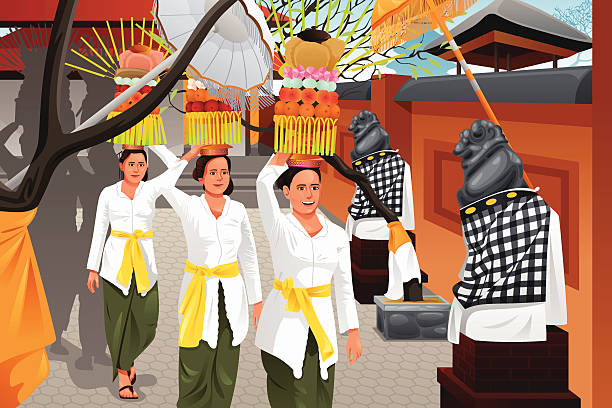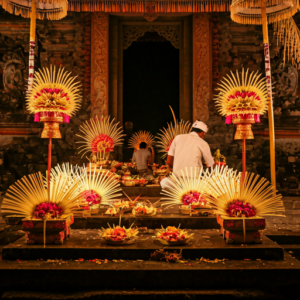Nestled in the Indonesian archipelago, Bali is far more than a tropical paradise of pristine beaches and lush landscapes. It is a spiritual sanctuary where ancient traditions pulse through every aspect of daily life, creating a unique cultural ecosystem that has captivated travelers and scholars alike for generations. Balinese spiritual traditions represent a profound and intricate system of beliefs that seamlessly blend Hinduism, animism, and deeply rooted local customs, forming a holistic worldview that touches every moment of existence.
The Roots of Balinese Spirituality: Hinduism with a Unique Twist
While Hinduism in Bali shares some fundamental principles with its Indian origins, the Balinese have developed a distinctive interpretation that is markedly different from practices found elsewhere. Known as „Agama Hindu Dharma,“ Balinese Hinduism is a syncretic belief system that incorporates indigenous animistic traditions, ancestral worship, and Buddhist influences, creating a spiritual landscape that is both complex and harmonious.
Unlike the philosophical Hinduism of India, Balinese Hinduism is intensely practical and experiential. It is not merely a set of abstract theological concepts but a living, breathing practice that permeates every aspect of life. Spirituality in Bali is not confined to temples or specific religious ceremonies but is woven into the fabric of daily existence.
The Cosmic Balance: Tri Hita Karana
Central to Balinese spiritual philosophy is the concept of „Tri Hita Karana,“ a fundamental principle that emphasizes harmony between three essential relationships:
- Parahyangan: The spiritual connection between humans and the divine
- Pawongan: The relationships between human beings
- Palemahan: The relationship between humans and nature
This holistic philosophy teaches that maintaining balance among these three domains is crucial for individual and collective well-being. It suggests that spiritual health, social harmony, and environmental respect are intrinsically linked and mutually dependent.
Rituals and Ceremonies: The Heartbeat of Spiritual Life
Balinese spiritual life is marked by an extraordinary number of rituals and ceremonies that punctuate the calendar. These are not mere religious obligations but profound communal experiences that reinforce social bonds and spiritual connections.
Daily Offerings: Canang Sari
Perhaps the most visible manifestation of Balinese spiritual practice is the daily ritual of creating and placing „canang sari“ – small, intricate offerings made from coconut leaves, flowers, and sometimes food items. These delicate squares are placed in front of homes, businesses, and temples, symbolizing gratitude and maintaining cosmic balance.
Each element of the canang sari is symbolic:
- Different colored flowers represent different gods
- The placement of these offerings in specific directions carries spiritual significance
- The act of creating and placing these offerings is a meditative practice in itself
Major Ceremonies: Complexity and Community
Bali hosts numerous significant ceremonies throughout the year, with some of the most important including:
- Nyepi (Day of Silence): The Balinese New Year, which involves a day of complete silence, meditation, and self-reflection
- Galungan: A celebration of the victory of good (dharma) over evil (adharma)
- Kuningan: A follow-up ceremony to Galungan, marking the return of ancestral spirits to heaven
These ceremonies are not just religious events but complex social gatherings that involve entire communities, demonstrating the collective nature of Balinese spiritual practice.
Spiritual Practitioners and Their Roles
Spiritual leadership in Bali is diverse and multifaceted. Unlike hierarchical religious structures, Balinese spiritual practitioners play various roles in maintaining community spiritual health.
Pemangku: Temple Caretakers
Pemangku are local priests responsible for temple maintenance and conducting rituals. They are not necessarily full-time religious professionals but often community members who have been entrusted with these sacred responsibilities.
Balian: Traditional Healers
Balian are spiritual healers who bridge the physical and spiritual worlds. They diagnose and treat ailments through a combination of spiritual insight, herbal knowledge, and traditional healing techniques. Their practice represents the holistic Balinese understanding of health that integrates physical, mental, and spiritual dimensions.
Sacred Spaces: Temples and Natural Sites
Bali is often called the „Island of a Thousand Temples,“ and this is no exaggeration. Temples are everywhere – in homes, villages, on mountains, and by the sea. Each has its unique spiritual significance.
Significant Temples
- Besakih Temple: Known as the „Mother Temple,“ located on Mount Agung’s slopes
- Uluwatu Temple: A clifftop temple offering breathtaking ocean views and spiritual energy
- Tirta Empul: A water temple famous for its holy spring water used in purification rituals
These temples are not just architectural marvels but living spiritual entities that continue to play crucial roles in community life.
Challenges and Preservation of Spiritual Traditions
In an increasingly globalized world, Balinese spiritual traditions face significant challenges. Modernization, tourism, and changing social structures threaten to erode these ancient practices. However, the Balinese demonstrate remarkable resilience in preserving their spiritual heritage.
Young generations are increasingly recognizing the value of their traditional practices, not just as cultural artifacts but as meaningful spiritual pathways. Community initiatives, educational programs, and a deep-rooted sense of cultural pride help maintain these traditions.
Conclusion: A Living, Breathing Spirituality
Balinese spiritual traditions are far more than a set of beliefs or practices. They represent a comprehensive worldview that emphasizes harmony, respect, and interconnectedness. In a world often fragmented by individualism and material pursuits, the Balinese approach offers a profound alternative – a way of living that sees the spiritual in the mundane, the sacred in the everyday.
For those willing to look beyond the surface, Bali offers not just a destination, but a transformative spiritual journey. Its traditions remind us that spirituality is not about grand gestures or abstract philosophies, but about moment-to-moment awareness, respect, and connection.






